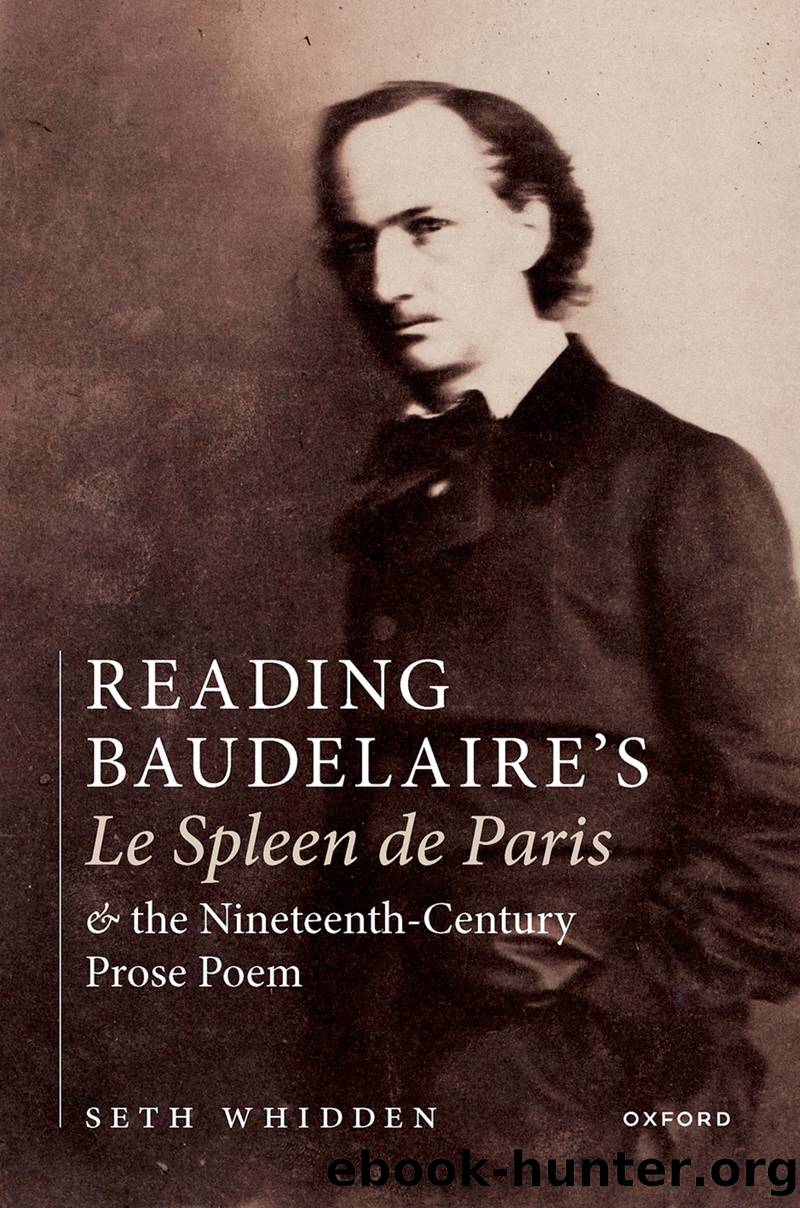Reading Baudelaire's Le Spleen De Paris and the Nineteenth-Century Prose Poem by Seth Whidden;

Author:Seth Whidden; [Whidden, Seth]
Language: eng
Format: epub
ISBN: 9780192666871
Publisher: OUP Premium
Published: 2022-05-05T00:00:00+00:00
18 See the earlier discussion of admiration in the Introduction, supra.
19 For Maurice Samuels, their discourse is invented by the narrator, âa man accustomed to projecting onto others his own thoughts and feelingsâ and who âexpects to see his carefully calibrated tenderness mirrored back to him by his loverâ; see Maurice Samuels, âBaudelaireâs Boulevard Spectacle: Seeing Through âLes Yeux des pauvres,ââ in E. S. Burt, Elissa Marder, and Kevin Newmark (eds.), Time for Baudelaire (Poetry, Theory, History), Yale French Studies, vols 125â6 (New Haven, CT: Yale University Press, 2014), 167â82 (171).
20 While Roland Barthes uses his formulation of a quotation without inverted commas (âla citation sans guillemetsâ) to refer to intertextuality, the example in this poem of a quotation qui nâen est pas une is positioned similarly with respect to language, and with similar stakes: âcâest alors du langage, et non un langage, fût-il décroché, mimé, ironiséâ (it is therefore from language, and not a language, whether it is disconnected, mimed, mocked) (Roland Barthes, Le Plaisir du texte, Åuvres complètes, vol. 2, ed. Ãric Marty [Paris: Seuil, 1994], 1509â10; original emphasis). As Barthesâs last word reminds us, the use of the citational modeâwhether with or without quotation marksâis an effective vehicle for conveying irony. For an elegant discussion of Flaubertâs use of quotations, see Christopher Prendergast, The Order of Mimesis: Balzac, Stendhal, Nerval, Flaubert (Cambridge, Cambridge University Press, 1986), 202â4.
21 Murphy points out the formerâs social import since its additional example of unspoken speechââon dirait queââsituates the father âen deçà de la critique sociale qui pouvait être formulée, à savoir que lorsquâon évalue globalement lâéconomie du Second Empire, câest bien lâargent du pauvre monde qui permet la fabrication de ces scènes de luxeâ (beyond the social criticism which could be formulated, which is to say that when we examine the economy of the Second Empire generally it is indeed the money of the poor which allows for the construction of these scenes of luxury) (Logiques du dernier Baudelaire, 249â50; original emphasis).
22 For the sake of clarity I wish to reiterate here that the first-person pronoun âjeâ should not at all be taken to refer to Charles Baudelaire himself; not only does such a reading derive from an oversimplification that seriously undercuts the poetâs imaginative reach, but, as Murphy reminds us, it reasserts the kind of traditional relationship between writer and reader that Baudelaire actively sought to reject (Logiques du dernier Baudelaire, 245â6).
23 For additional examples of Baudelaireâs blending of humor and platitudes, see his âChoix de maximes consolantes sur lâamourâ (OC 1: 546â52).
24 Jacques Garelli, âLâÃcoute et le Regard,â LâEntrée en démesure suivi de LâÃcoute et le Regard; et de Lettre aux aveugles sur lâinvisible poétique (Paris: José Corti, 1995), 51â83 (82).
25 See the discussion of Baudelaireâs use of aphorism in the prose poems, particularly in the opening line of âLâHorloge,â in Chapter 1, supra.
26 Murphy picks up on another audible element in this poem: âLâenchaînement vous voulûtes vous a quelque chose de volontairement cacophonique, aux antipodes de lâeuphonie Ã
Download
This site does not store any files on its server. We only index and link to content provided by other sites. Please contact the content providers to delete copyright contents if any and email us, we'll remove relevant links or contents immediately.
4 3 2 1: A Novel by Paul Auster(12375)
The handmaid's tale by Margaret Atwood(7757)
Giovanni's Room by James Baldwin(7330)
Asking the Right Questions: A Guide to Critical Thinking by M. Neil Browne & Stuart M. Keeley(5759)
Big Magic: Creative Living Beyond Fear by Elizabeth Gilbert(5756)
Ego Is the Enemy by Ryan Holiday(5415)
The Body: A Guide for Occupants by Bill Bryson(5082)
On Writing A Memoir of the Craft by Stephen King(4935)
Ken Follett - World without end by Ken Follett(4723)
Adulting by Kelly Williams Brown(4566)
Bluets by Maggie Nelson(4548)
Eat That Frog! by Brian Tracy(4526)
Guilty Pleasures by Laurell K Hamilton(4439)
The Poetry of Pablo Neruda by Pablo Neruda(4097)
Alive: The Story of the Andes Survivors by Piers Paul Read(4020)
White Noise - A Novel by Don DeLillo(4006)
Fingerprints of the Gods by Graham Hancock(3996)
The Book of Joy by Dalai Lama(3976)
The Bookshop by Penelope Fitzgerald(3844)
